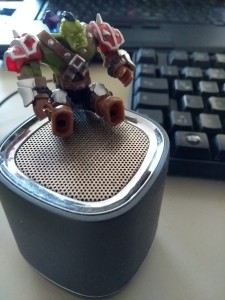Jump right in, it’s warm
Do you remember the summer of your youth? That one summer that lasted for years? When a single day felt like an entire lifetime? The endless blue sky? The sweet scent of the wild flowers along the way? The earth underneath you, while staring at the impeccable blue above? Your trusted friends next to you? Silent and in awe of the grandness of the world? That one moment, when you knew with absolute certainty, that you were a part of it all, of its grandness, of its splendor, of its eternal beauty? That one summer of your youth when you felt you were at one with yourself and with the world. And in the evening, staring into the flickering light of a fire, you knew just as certainly, that it all would have to end. And like innocence once lost, it would never come back.
But.
We got lucky.
We have books.
Books that can bring us back to that sweet moment when that endless summer was still grand and full of wonder.
Elizabeth von Arnim’s Enchanted April can do that wonderfully. But that is a story for another day.
Castle Gripsholm can do it too. Kurt Tucholsky takes us back to a summer of splendor and sated laziness in Sweden.
Hop on the train
Princess and Peter leave Berlin for a five-week holiday in Sweden. We all know what it feels like to get away from it all, the pointless routines, the busy cities, the noise. So does Princess. Her real name is actually Lydia, but Peter calls her Princess, because that’s what she is to him. Which is fair enough because his name is actually Kurt, not Peter, and Princess tends to call him Fritzchen, for reasons unbeknownst to us. Never mind.
The year is 1929 (when the real journey took place, or 1931 when the novella was published) and we, as well as our loving couple, are very much aware that this will be the last summer. And when it is over, there will be nothing left but fond memories of a moment in time, when the world moved on a hinge. Peter is aware of it. He knows perfectly well who is fighting in the streets of Berlin. This is more than just a summer vacation. This is the last chance to take a deep breath before everything falls apart.
The castle by the lake
The scenery couldn’t be more idyllic. A lake, a castle from the 16th century, no other tourists. Princess and Peter enjoy the silence and each other, they take long walks, they lie in the grass, they chat with the local folk. Every single moment feels feather-light in a strangely laconic way.
Friends come to visit, first Karlchen, then Billie. Their appearance on the scene does not spoil the lazy days, but it certainly adds a little spice to their evenings and nights.
A ménage à trois unfolds, tentatively, almost shy. And beautifully written.
The child
Not everything is bright and beautiful in the village of Mariefred. A child catches their eye, a girl, terrified and abused. It needs to be rescued from a brutal headmistress of a children’s home. But do they care?
They do. It takes some effort, it spoils their lazy days, but they know they have to do it, because no one else will.
Beside this being a wonderfully romantic and humorous feast of summer, it is also a story of not turning your back. Not looking the other way.
Lost innocence
It ends. Of course it does. It has to. Has the world ever been innocent? Probably not. Have we? It certainly feels like it. Thinking back to that one summer of our youth, we feel the loss most dearly. Princess and Peter know what they return to. Kurt Tucholsky knew that he could not return to it.
He was a publicist, a journalist, an essayist, a novelist, and a keen observer of the political development in Germany at the time. His experience as a soldier in WW 1 made him become a passionate pacifist. He used his sharp wit, his satiric sense of humor and his precise observations to expose abuse of political power wherever he found it. And there was lots to be found in the Weimar Republic.
In 1929, he moved to Sweden permanently, fully aware that independent journalism was no longer possible in Berlin.
His health suffered, he stopped publishing. On the 10th of May 1933 his books were among those that the Nazis threw into the fire. Behind the scenes he tried to support his friend Carl von Ossietzky, with whom he had published the magazine Die Weltbühne and who had been imprisoned in a KZ.
Kurt Tucholsky died on December 21, 1935, most likely of an unintentional overdose of pain medication. His ashes were buried in Mariefred, near Castle Gripsholm.
The memories
When I learned that Castle Gripsholm was to be published in English¹, I was worried. Worried that the local dialects, the satirical puns, the word-play would be impossible to translate adequately. For sheer sentimentality I immediately read it again, as if that would at least preserve its utter beauty before it was exposed to the transformation into another language. Stupid me.
The truth is, it doesn’t matter.
First of all, I needn’t have worried at all, because Michael Hofmann is a wonderful translator. He managed to do Döblin’s Berlin Alexanderplatz justice, so English readers are in very capable hands.
Furthermore, Castle Gripsholm is not about puns or dialects, it is about us, our youth, the inevitable loss of innocence.
With this short novella you can go back. Capture once more that splendor of a boisterously grand moment when everything seemed to be right in the world. The perfect state of being. Just being.
Now you do it.
Go back. And bask in that fleeting memory of that one perfect summer. At least for an hour or two. The colours may be a bit faded but I promise, you will smell the wild flowers along the way.
And while you’re there, save a child. It might be you.
¹CASTLE GRIPSHOLM, by Kurt Tucholsky, translated from the German by Michael Hofmann, NYRB Classics, ISBN: 9781681373348, Pages: 144, Publication Date: May 7, 2019




